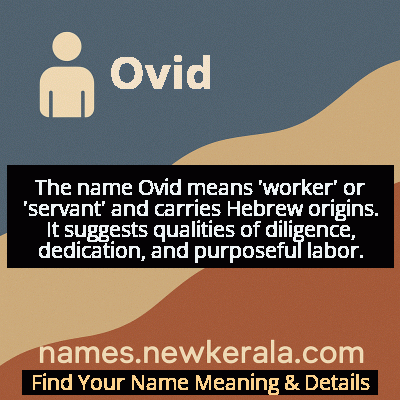Ovid Name Meaning & Details
Origin, Popularity, Numerology Analysis & Name Meaning of Ovid
Discover the origin, meaning, and cultural significance of the name OVID. Delve into its historical roots and explore the lasting impact it has had on communities and traditions.
Name
Ovid
Gender
Male
Origin
Hebrew
Lucky Number
5
Meaning of the Name - Ovid
The name Ovid means 'worker' or 'servant' and carries Hebrew origins. It suggests qualities of diligence, dedication, and purposeful labor.
Ovid - Complete Numerology Analysis
Your Numerology Number
Based on Pythagorean Numerology System
Ruling Planet
Mercury
Positive Nature
Adventurous, dynamic, curious, and social.
Negative Traits
Restless, impatient, inconsistent, prone to indulgence.
Lucky Colours
Green, white.
Lucky Days
Wednesday.
Lucky Stones
Emerald.
Harmony Numbers
1, 3, 9.
Best Suited Professions
Sales, marketing, travel, entertainment.
What People Like About You
Versatility, charisma, adventurous spirit.
Famous People Named Ovid
Ovid
Roman Poet
Author of 'Metamorphoses,' one of the most influential works in Western literature
Ovid Butler
Educator and Founder
Founded Butler University in Indianapolis, Indiana
Ovid Demaris
Author and Journalist
Wrote numerous crime novels and non-fiction books about organized crime
Ovidiu Hațegan
Football Referee
Renowned FIFA and UEFA referee officiating major European matches
Name Variations & International Equivalents
Click on blue names to explore their detailed meanings. Gray names with will be available soon.
Cultural & Historical Significance
Simultaneously, the name is forever linked to Publius Ovidius Naso, the celebrated Roman poet whose works, particularly 'Metamorphoses,' have shaped Western literature, art, and thought for over two thousand years. Ovid's literary legacy represents the pinnacle of classical civilization and the enduring power of storytelling. The cultural significance thus spans from ancient Hebrew values of service to the heights of Roman artistic achievement, creating a name that embodies both practical virtue and creative excellence. This unique combination has allowed the name to maintain cultural relevance across centuries, appealing to those who value both classical education and timeless moral principles.
Extended Personality Analysis
Individuals bearing the name Ovid typically exhibit a distinctive blend of intellectual depth and practical diligence, reflecting both the literary heritage and the Hebrew meaning of their name. They often possess strong analytical capabilities combined with creative insight, making them excellent problem-solvers who can approach challenges from both logical and imaginative perspectives. Their natural curiosity drives them to seek knowledge and understanding, while their inherent diligence ensures they follow through on their pursuits with determination and thoroughness.
In social contexts, Ovids tend to be thoughtful communicators who value meaningful conversation and intellectual exchange. They often demonstrate a quiet confidence rather than overt assertiveness, preferring to lead through wisdom and competence rather than authority. The 'worker' aspect of their name manifests in their reliable nature and strong work ethic, while the poetic association lends them artistic sensitivity and appreciation for beauty in various forms. This combination typically results in individuals who are both grounded in reality and capable of visionary thinking, making them valuable contributors in both practical and creative endeavors.
Modern Usage & Popularity
In contemporary naming practices, Ovid occupies a unique position as a classic yet uncommon choice that appeals to parents seeking names with intellectual and historical resonance. While it has never achieved widespread popularity in English-speaking countries, it maintains a steady presence among families with classical education backgrounds or particular appreciation for literary history. The name has experienced minor resurgences during periods when vintage and classical names gain favor, though it typically remains outside the top 1000 names in the United States and United Kingdom. In Romania, the variant Ovidiu enjoys more substantial usage as a traditional masculine name with national recognition. Modern usage trends suggest that Ovid is increasingly chosen by parents who value distinctive names with deep cultural roots, particularly those interested in names that bridge different cultural traditions and historical periods while maintaining a sophisticated, timeless quality.
Symbolic & Spiritual Meanings
Symbolically, the name Ovid represents the powerful intersection of transformation and enduring legacy, drawing rich meaning from both its Hebrew roots and Roman associations. The most prominent symbolic connection comes from Ovid's 'Metamorphoses,' which embodies the universal theme of change and transformation—the idea that all things evolve and nothing remains static. This symbolizes personal growth, adaptation, and the continuous process of becoming that defines human experience. Simultaneously, the Hebrew meaning of 'worker' symbolizes the dignity of labor, the value of service, and the transformative power of dedicated effort. The name thus carries dual symbolic weight: it represents both the artistic transformation of ideas into enduring cultural artifacts and the practical transformation achieved through diligent work and service. This combination creates a powerful symbolic narrative about how purposeful labor and creative expression together shape both individual identity and cultural legacy.

